
Excerpted from the story "7 AI-Powered Technologies You Should Know About" published on UC San Diego Today August 22, 2023
“Recommended For You:” We see it every time we log on to Netflix, Hulu, Disney+ or any other popular streaming app. Armed with data about what types of content you watch and how long you stay tuned in, these companies employ personalized machine learning algorithms to figure out your preferences. But what if these recommender systems could go one step further? What if you could talk to them about your likes and dislikes, and they could talk back to you, or adjust their recommendations accordingly?
In his lab in the Jacobs School of Engineering, computer science professor Julian McAuley, who specializes in recommender systems, is in the early stages of making this idea a reality. With funding from Netflix, he and his team are building demo systems to explore the possibility of what this technology could look like and how users might respond to it. In tandem with the rapid acceleration of generative AI tools like ChatGPT over the past year,

McAuley has observed an exponential increase in interest around conversational recommender systems.
This work involves merging large language models, the subset of AI that underlies ChatGPT, with traditional recommender systems that are focused on coming up with suggestions in highly specific areas. To train the model, McAuley and his team are collecting datasets of movie reviews, conversations about movies from Reddit and more.
“This idea has gone from seeming kind of impossible to seeming like something that is almost within reach,” said McAuley, who says this technology could have potential applications that extend far beyond movies, to include e-commerce, fashion, fitness and more. “Everyone wants to get on board with building and deploying these things.”

